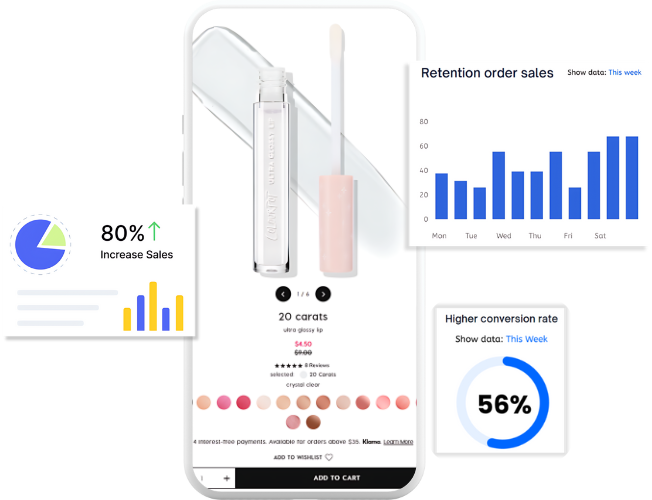
Successful e-commerce brands are built on solid platforms that allow merchants to give their customers the best experience. Two of the biggest are Big Cartel and Shopify. Big Cartel says it’s where artists and small businesses open online stores while Shopify can help merchants build and scale their brands fast. This Big Cartel vs Shopify comparison will break down their features and pricing so you can decide which one to start with.
Big Cartel and Shopify: An Overview
Big Cartel Key Features
A Platform for Artistic Success
One of the best things about Big Cartel is the design. Everything is intentionally designed for creative entrepreneurs, from the dashboard to the product management system. Whether you’re a jewelry designer, print artist, or vintage curator you’ll find the platform super easy to use.
Tools That Make Selling Easy
The platform excels at inventory management. You can add products in minutes with simple forms that cover all the basics without overwhelming you with options. For those on paid plans the bulk editing feature is a game changer – imagine updating prices or stock levels across your entire collection with a few clicks.
Built-in Marketing
What Big Cartel does differently is its SEO and marketing through the templates. Every template is SEO-optimized out of the box to help businesses achieve organic traffic. They also have simple but effective tools for running promotions. You can create discount codes, schedule sales and track their performance all in one clean interface.
Real-Time Insights
The sales dashboard is another winner. It’s clear and not overwhelming with complex metrics. Orders, inventory, and spot trends are all displayed in a way that makes sense if you’re not a data nerd.
A Community That Grows With You
Big Cartel has built a community of over 3 million shops worldwide. That’s not just a number – it’s a marketplace that generates over $2.5 billion in global sales. You’re not just getting a store – you’re joining a community of creators.
Big Cartel has a community of over 3 million shops worldwide. That’s not just a number – it’s a marketplace with profiting sales of over $2.5 billion globally. What you own is not just a store online but joining a community of brilliant makers.
Store Management on Your Time
You can manage your store from anywhere at any time with the mobile-friendly admin interface. Imagine you’re at a craft fair, in your studio, or on the go, you can update products, process orders, and track sales from your phone or tablet conveniently. It’s about giving you the freedom to run your business your way.
Big Cartel Pros & Cons
Pros:
- Affordability. Bigcartel has transparent and entrepreneur-friendly pricing. Big Cartel is for indie sellers so they have a free plan and affordable paid options starting at $9.99/month. No hidden fees beyond payment processing so you can budget with ease.
- Easy Store Management. The platform is super simple and streamlined. Whether you’re updating inventory, processing orders, or tracking sales everything feels designed to save you time.
- Active Creative Community. With 3 million+ shops and $2.5B in sales, Big Cartel has a big community of sellers. This community focus means opportunities for exposure and networking that others can’t match.
- Built-in SEO. It has special SEO-optimized templates and efficient marketing tools for innovative businesses.
Cons:
- Product Limitations. The premium plan is limited to 500 products so may not be suitable for growing businesses or those with large product lines.
- Basic Marketing Tools. They work but the marketing and promotional tools are limited compared to other e-commerce solutions.
- Simple Analytics. The reporting covers the basics but not the details you need for business planning.
- Limited Customization. Store design options are easy to use but do not have full control over your online presence.
Shopify Key Features
A Platform Built for Business Growth
Shopify’s biggest strength is its all-in approach to online selling. It thinks everything about a merchant to start an online store, from the dashboard to the inventory management. Whether you’re a boutique shop or a large operation like Anatta, everything is available to businesses.
Smart Features That Drive Sales
The platform is great for multi-channel commerce. You can sell across multiple channels – your online store, social media, POS, and marketplaces – all in one clean interface. For businesses looking to scale, this unified approach to omnichannel selling is a game changer.
Customization That Sets You Apart
Shopify’s theme system is super flexible. 100+ professional themes and Liquid templating language means you can build a store that matches your brand. The app marketplace (8,000+ integrations) lets you add what you need through the Shopify App Store.
Payment Solutions That Mean Business
The platform’s approach to payments is thoroughly professional. Shopify Payments provides native processing, while support for 100+ payment gateways ensures you can serve customers worldwide. Multi-currency support and country-specific pricing make international selling straightforward and efficient.
Abandoned Cart Recovery Tools That Protect Revenue
The abandoned cart recovery system showcases Shopify’s attention to detail. This intelligent feature automatically reaches out to customers who’ve left items in their cart, helping you recapture potentially lost sales through automated emails or manual follow-up campaigns.
Shopify Pros & Cons
Pros:
- App Ecosystem. Shopify has over 8,000 apps, free and paid. The app store is a treasure trove of everything from marketing automation to advanced shipping solutions. It’s a very versatile platform.
- Omnichannel Selling. The platform is great at multi-channel commerce, you can sell through online stores, social media, marketplaces, and in-person points of sale. You can reach customers wherever they shop.
- Customization. Shopify has deep customization options through its theme system and liquid programming language. You can create a store that matches your brand perfectly, from simple tweaks to a completely custom design.
- Enterprise Features. From inventory management to detailed analytics, Shopify has professional-grade tools that can grow your business. They have features for small boutiques to large-scale operations.
Cons:
- Higher Cost Structure. $39/month for the Basic plan and $399/month for the Advanced, Shopify can be expensive for small businesses and startups. Add in app and payment processing fees and it can add up fast.
- Steep Learning Curve. With so many features comes complexity. New users will find the platform overwhelming at first and will need time to learn all the ins and outs.
- Transaction Fees. If you’re not using Shopify Payments, you’ll pay transaction fees on all sales which can eat into your profit margins, especially if you’re a high-volume seller.
- Theme Customization Complexity. While highly customizable, making big changes to the theme often requires technical knowledge or professional help which means extra cost for many merchants.
#1 Big Cartel vs Shopify: Pricing
Big Cartel Pricing
Big Cartel’s main selling point is its affordability, a comforting factor for small business owners and artists running a Big Cartel store. The Gold plan is free forever, allowing users to list five products and one image per product. It’s a budget-friendly option that supports online selling and comes with limited customizations.
The paid plans support multi-channel selling and let merchants use a custom domain. Merchants can print unlimited shipping labels, bulk edit their listings, and track inventory.
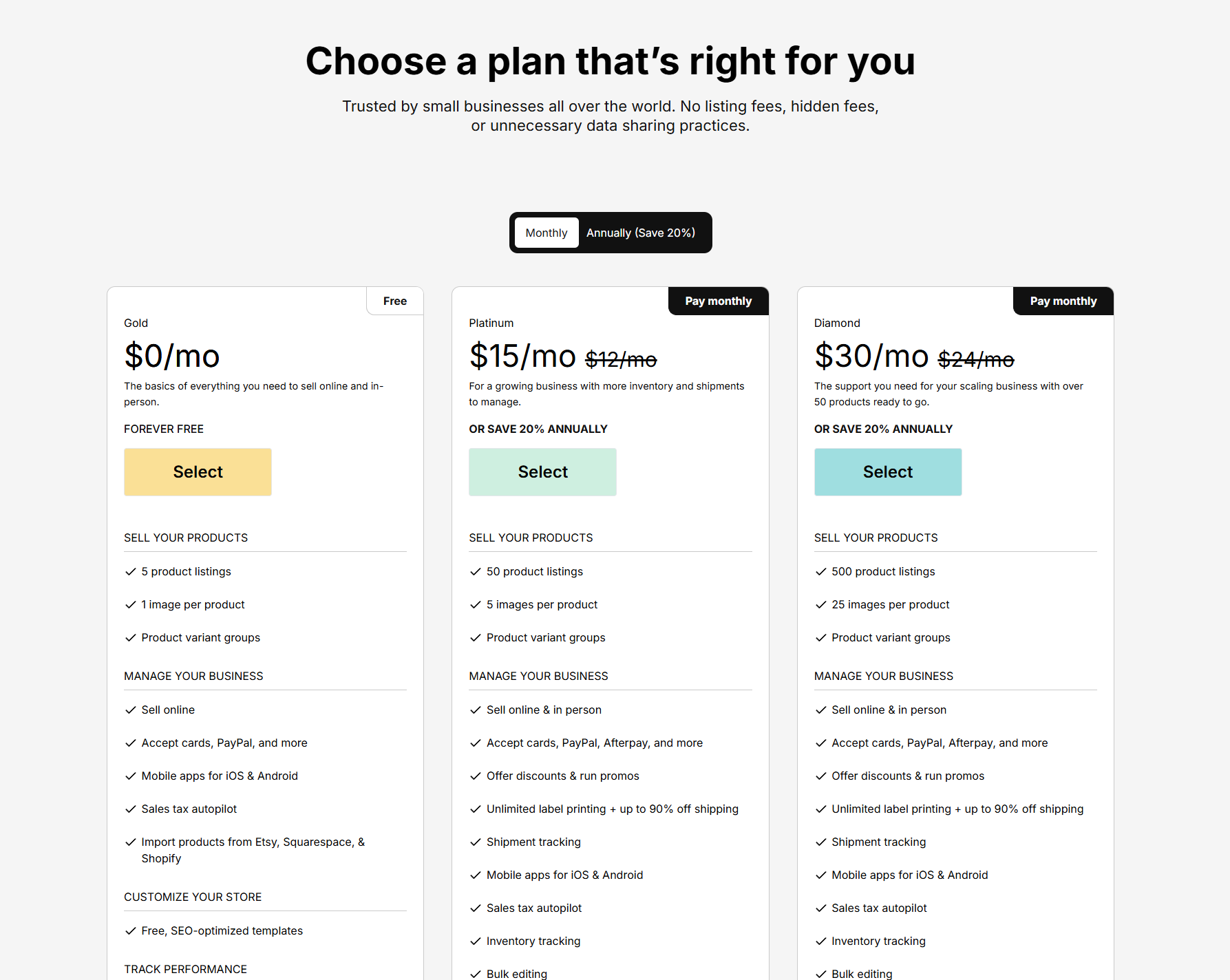
For the Platinum plan, sellers pay $15/month to sell 50 products. This plan allows merchants to add up to five images per product. Upgrading to the Diamond plan will enable stores to sell up to 500 products and include 25 images per item.
Shopify Pricing
All Shopify plans feature 24/7 support, at least ten inventory locations, localized global selling in at least three markets, and POS Lite. The features increase as you upgrade to higher tiers, empowering entrepreneurs with advanced tools to scale their businesses.
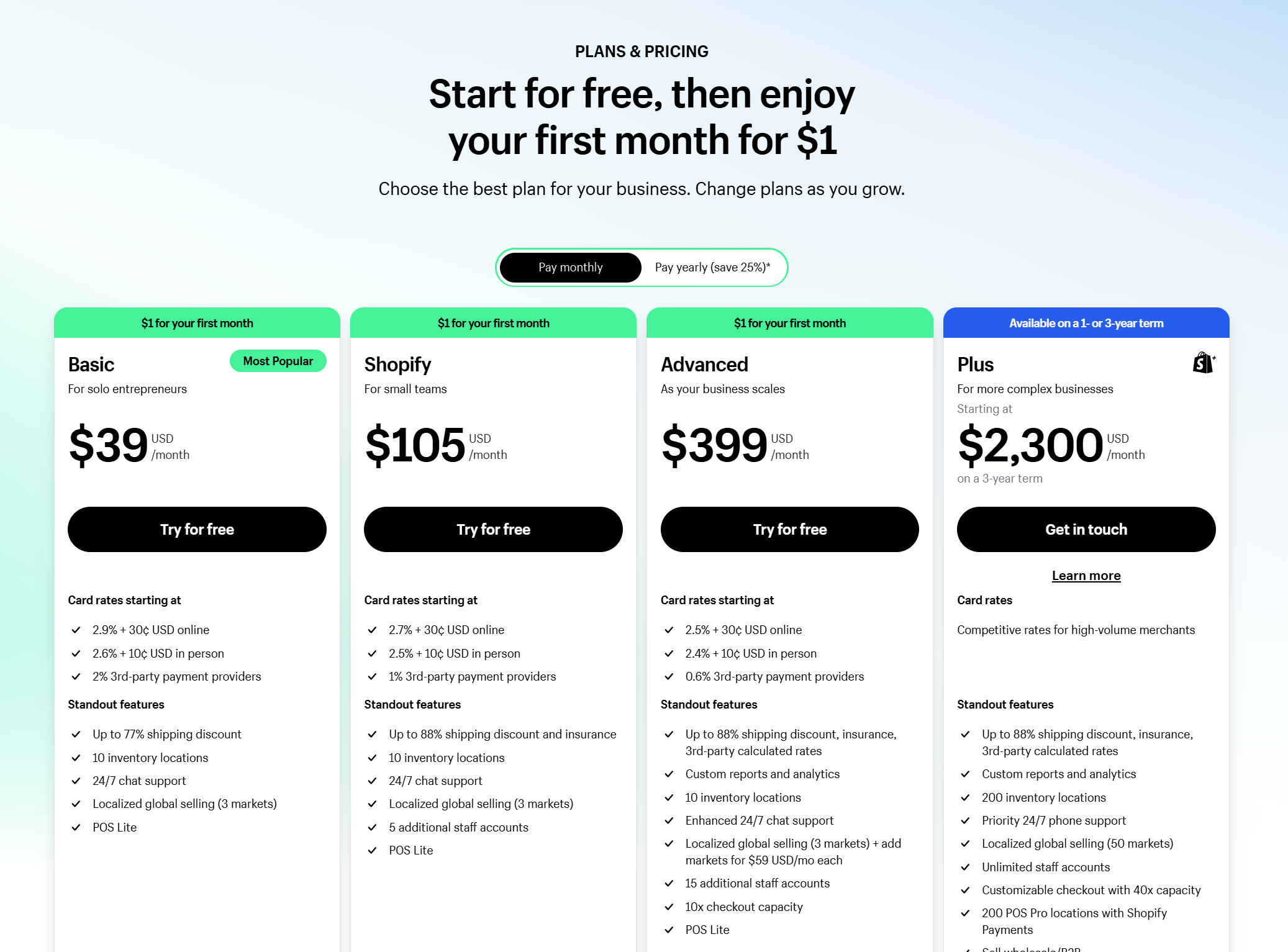
Shopify’s regular plans start at $32/month for the Basic Plan, which is best suited for solopreneurs. The $92/month Shopify plan is designed for small teams and supports five additional seats.
The advanced plan is 15 extra staff for $399/month. Businesses get custom analytics support, 10x checkout capacity, and can add more markets for $59 monthly.
Shopify Plus is customized for large enterprises. This plan starts at $2,300 per month for a 3-year term. Its features include 200 inventory locations, custom reports and analytics, 50 localized global selling markets, wholesale and B2B selling, unlimited staff accounts, 200 POS locations, and a customizable checkout process with 40x capacity.
Shopify doesn’t offer a free plan but has a 3-day free trial for merchants to build their stores and experience all the features. After that, you can pay $1/month for 3 months and then commit to one of the plans above.
Big Cartel is the best choice for small creators and businesses that want to dip their toes in the e-commerce waters. On the other hand, Shopify is better suited to online businesses that plan to expand locally and globally. The learning curve for users is worth the trouble as it eventually allows them to customize experiences for their customers.
#2 Big Cartel vs Shopify: Site Building & Designs
Professional Power of Shopify
Shopify’s design ecosystem shows it’s a powerful e-commerce expertise in all aspects. With 110+ professional themes to choose from, merchants can create an online store reflecting your brand style. From boutique retailers to global brands, Shopify’s theme collection has got you covered.
The drag-and-drop builder puts professional design in everyone’s hands. Beginners can arrange layouts step by step while seasoned merchants can implement complex design elements according to brand image. For those who want total control, the Liquid templating language gives you unlimited customization options to make your store stand out in the digital marketing world.
Creative Simplicity of Big Cartel
Big Cartel approaches store design from an artistic perspective, so it’s perfect for creative businesses selling online. The theme collection is curated with creative concepts in mind to highlight your work. Every design choice feels stylish and crafted to showcase your artistic products.
What makes Big Cartel special is simplicity without sacrificing style. The clean editing interface removes technical hurdles so you can focus on presentation not wrestling with settings. Every template is optimized for visual impact so your creative work grabs attention straight away.
#3 Big Cartel vs Shopify: Themes
The customization of themes plays an important role in an e-commerce platform. Big Cartel and Shopify provide pre-built templates that store owners can easily customize to their brand colors and to match the experience they want to offer customers.
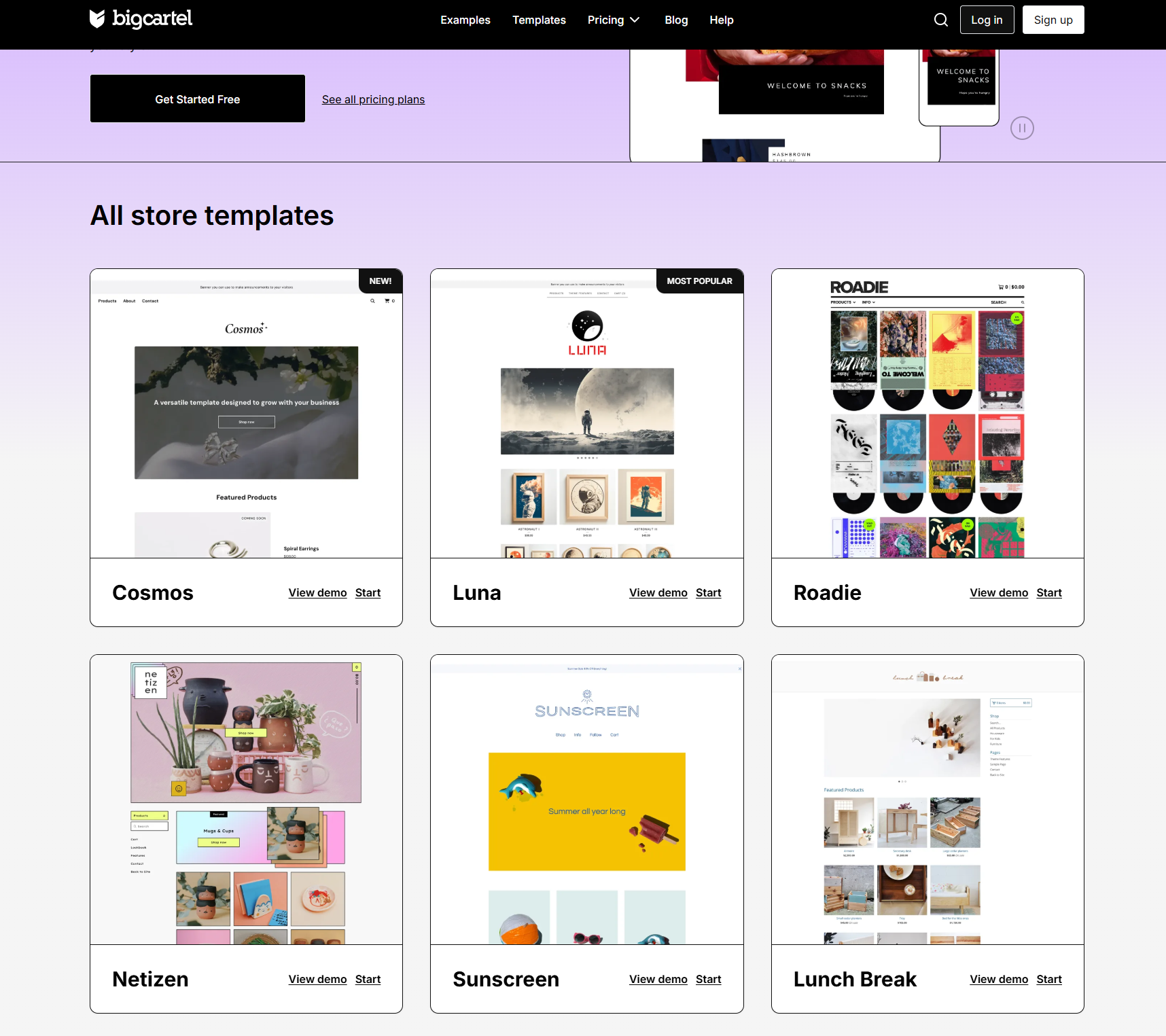
There are up to 17 themes available on the Big Cartel website. Although this number is not impressive compared to Shopify’s 200+, the upside is that all Big Cartel themes are free with any of the three plans.
The themes are mobile-optimized, but customization flexibility is limited. Enhancing your store with supplementary features like a blog platform requires programming expertise, presenting a significant hurdle for entrepreneurs who aren’t versed in web development. The template options on Big Cartel are also suited to those with a minimalistic store appearance.
Shopify themes offer intuitive drag-and-drop capabilities. Such straightforward customization eliminates the need for coding expertise, empowering merchants to unleash their creative vision and craft striking online storefronts.
Mobile responsiveness is also pre-built into all Shopify themes, whether free or paid. This allows brands to offer their customers an exceptional and convenient shopping experience, even on the go. Shopify also features advanced themes that are best suited to building online stores for large enterprises.
#4 Big Cartel vs Shopify: SEO Tools
Shopify sets the bar high for e-commerce SEO with its comprehensive approach. With its user-friendly basics and powerful advanced features, businesses of all sizes can implement strategic site-wide optimization. Through an intuitive dashboard, merchants can efficiently manage essential elements like meta tags and URL structure across all pages. Complex optimization is available as long as experienced users need it, including backlink management and technical SEO. Merchants can reach Shopify’s App Store to extend these capabilities with apps like SEOAnt for performance optimization, image compression, and navigation enhancement.
Big Cartel takes a minimalist approach to SEO. The platform has the basic optimization tools for clean navigation, basic page titles, and standard URL structures. This is perfect for creative entrepreneurs and small businesses who want simplicity over features. While it’s enough for basic online visibility, Big Cartel’s SEO capabilities might feel limited for businesses that want more control over optimization.
#5 Big Cartel vs Shopify: Apps and Integrations
Shopify is the king of integrations with its massive app ecosystem. Shopify’s App Store boasts over 6,000 integrations. This vast ecosystem provides merchants with every tool they need – from marketing automation to shipping solutions, and inventory tracking to customer service platforms.t. Through an easy-to-use interface, businesses can connect to major platforms like Facebook, Instagram, and Amazon to do multi-channel marketing. Shopify also has a native email marketing solution with customizable templates direct promotional capabilities and the ability to expand with third-party apps.
Big Cartel takes a more targeted approach to integrations with 29 handpicked apps. The platform offers limited social connectivity, with Instagram Shopping standing as its main integration point. While limited to native integrations, merchants can connect to other services and platforms with Zapier. This is perfect for small businesses and creative entrepreneurs who prefer simplicity over lots of integrations. However, limited native email marketing and social media integrations might not be enough for businesses that need more marketing tools.
#6 Big Cartel vs Shopify: Sales Features
Big Cartel sales features are limited because the platform primarily targets small businesses and artists. Merchants using this platform have to contend with a 500-product limit compared to unlimited items on Shopify. Moreover, the number of product variant groups is smaller on Big Cartel.
Shopify has developed a dedicated app store where customers can access various Shopify sales tools to boost sales on their e-commerce websites. Big Cartel does not have such an app store but lets you offer discounts and run promos if you are on the Platinum and Diamond plans.
Inventory management options are limited on Big Cartel, but with a Shopify account, you can manage ten inventory locations or up to 200 locations if you are on Shopify Plus. Big Cartel also primarily supports online selling with limited multi-channel selling, while Shopify lets you sell on your website, physical store, marketplaces, and across social media.
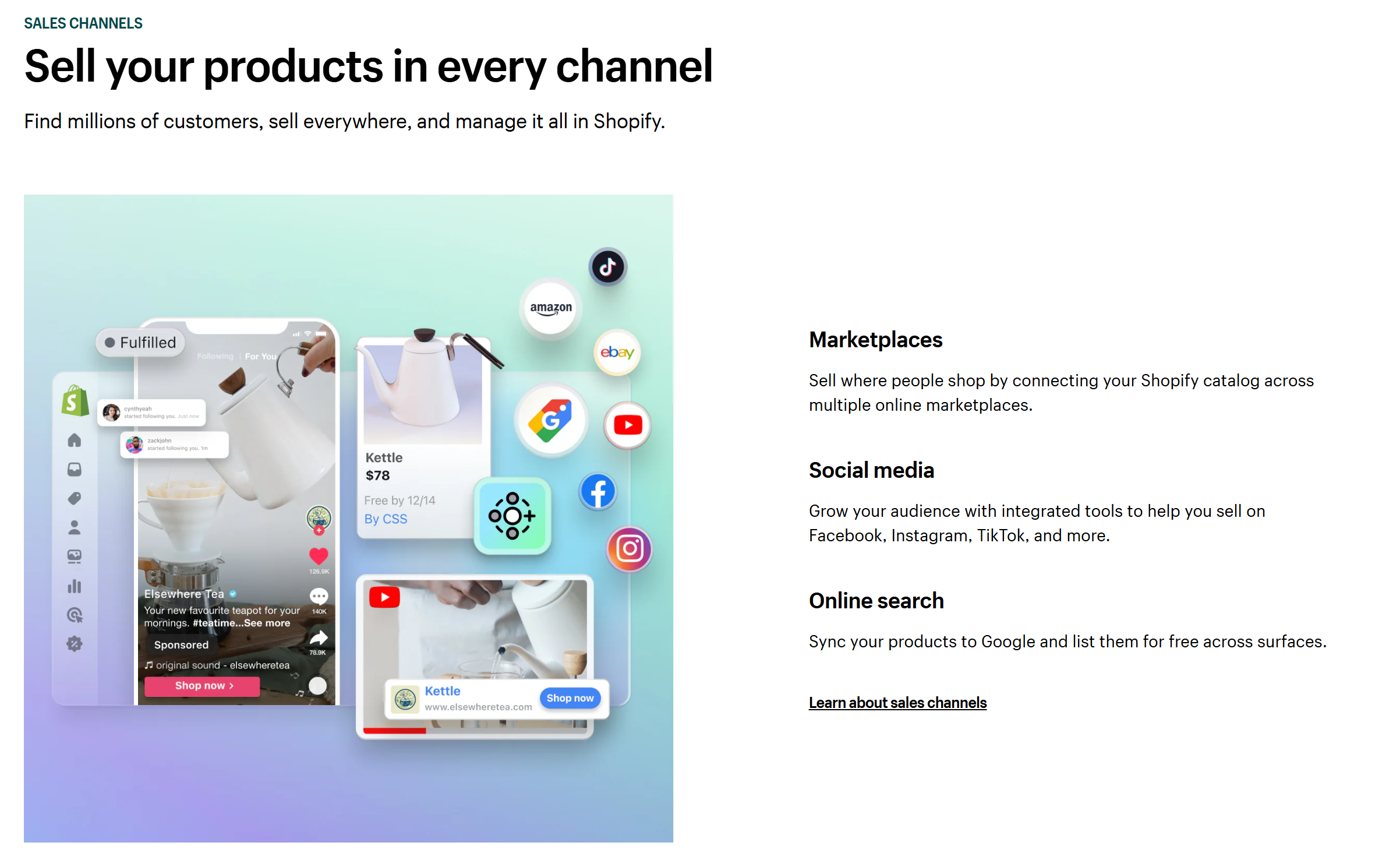
Selling on Shopify gives you access to advanced selling tools such as cart abandonment recovery and customized checkout. This means optimizing conversions on Shopify is easier than on Big Cartel.
#7 Big Cartel vs Shopify: Payment Processing
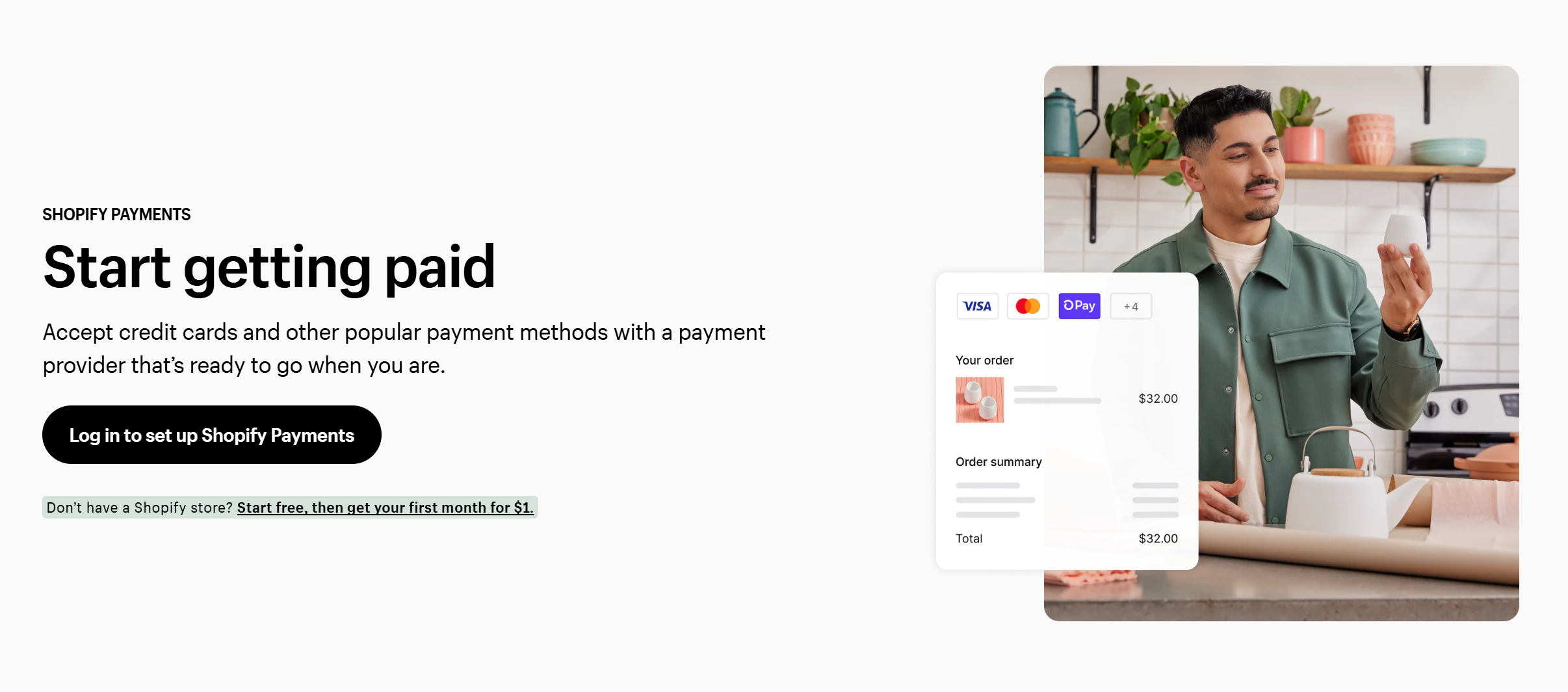
Shopify offers store owners a native integrated payment processor called Shopify Payments. It is built into the platform and supports over 100 payment gateways. No fees apply when merchants accept payments via Shopify Payments.
However, if a seller opts to use a third-party payment processor, they will pay the processor’s standard fee plus Shopify’s credit card processing fee, depending on their plan. For example, if accepting payments through Stripe, the merchant will pay Stripe’s 2.9% + $0.30 transaction fee plus an additional 2%, 1%, or 0.5%, depending on whether they are on the Basic, Shopify, or Advanced plan, respectively.
If you sell internationally, Shopify offers multi-currency support. The caveat is that Shopify Payments has to be your store’s primary payment processor. Customers can pay you in their local currency via Shopify Payments credit card payments, Shop Pay, Apple Pay, Google Pay, and PayPal Express.
On the other hand, Big Cartel does not offer a variety of gateways similar to Shopify’s payment options. The platform is limited to Stripe, Square, and PayPal, which it connects merchants’ stores to via third-party agreements. However, sellers can still access mobile payments via Google Pay and Apple Pay. This is possible because Stripe and Square connect to these mobile wallets.
Since you will be using third-party payment processors, you will not incur any fees on Big Cartel, but you must pay the standard 2.9% + $0.30 charge per transaction billed by these payment providers.
The payment flexibility offered by Shopify allows merchants to provide customers with a more convenient checkout experience. This helps reduce cart abandonment rates and boost conversions.
#8 Big Cartel vs Shopify: Dropshipping
Both platforms allow users to conduct dropshipping business. Let’s see the difference.
Big Cartel offers two dropshipping options via The Art of Where and Printful. Independent artists can authorize such two companies to print their artwork on products and sell them to customers. Technically speaking, this is categorized as a print-on-demand service rather than dropshipping.
Shopify, as a professional e-commerce platform, is the hands-down winner in this department. Shopify’s App Store offers many dropshipping integrations to assist you in starting your dropshipping business or scaling up an existing one.
More importantly, Shopify’s dropshipping helpers don’t just work in the category of printed artwork. Compared with Big Cartel, Shopify supports a broader range of products regarding dropshipping.
#9 Big Cartel vs Shopify: Customer Support
These two platforms both have user-friendly interfaces and documentation for the setup and management of stores. But Shopify excels at support infrastructure. It has 24/7 support via live chat, phone, and email so merchants can get help whenever they need it. Plus Shopify has an active community forum where business owners share experiences, troubleshoot issues, and talk about industry trends.
Big Cartel has a more limited support structure. Their help center is 24/5 on weekdays. For Saturday and Sunday, they are available from 8 am-6 pm EST. You can also email them via [email protected], and you may solve your problems within 2 hours. The platform lacks a community forum, which can limit peer-to-peer learning and networking opportunities for merchants.
Is Big Cartel Better than Shopify? Which is Better for Your Business?
Shopify: Unlimited Growth
Shopify’s approach to e-commerce is all about the extras. The platform has various features, advanced customization tools, and robust marketing solutions. Whether you’re starting from scratch or growing an existing brand, Shopify has the infrastructure for you.
For beginners, Shopify has a user-friendly interface with step-by-step tutorials and 24/7 customer support. Its free trial also serves as an excellent opportunity for newbies in the e-commerce world to have their first taste of this field.
For mature businesses, Shopify offers a comprehensive set of built-in features and over 8,000 integrations in its App Store. It can help you handle high traffic, especially during peak times like New Year’s Eve and Easter. You can also migrate to Shopify Plus for great scaling.
Big Cartel: Designed for Creative Control
Big Cartel approaches e-commerce with an artistic mindset. The platform’s simple interface and focused features are built for independent creators and small businesses. Each tool and option feels thoughtfully curated, so artists can bring their vision to life without getting lost in the technical details.
Independent artists and makers run relatively simple businesses with fewer needs and lower transactions. They are also no experts in the field of e-commerce. Such a case perfectly matches Big Cartel features.
Second are small business owners. Such a group has a relatively low budget and a less professional team. Big Cartel’s affordability matches their business scales and plans for the future.
Making the Strategic Choice
The real beauty of these platforms lies in how they serve different business needs:
- Shopify excels when you need robust features, scalability, and comprehensive tools for growth. Its extensive app marketplace, 24/7 support, and advanced customization options make it perfect for businesses with ambitious growth plans.
- Big Cartel shines for creative entrepreneurs seeking simplicity and affordability. Its straightforward pricing, artist-focused features, and intuitive interface make it ideal for independent creators focused on showcasing their work.
What’s Next?
If you work in the field of art and intend to start your small business for the first time in your life, Big Cartel is the better fit. However, if you want to step into the e-commerce world seriously and scale up your business one day, Shopify is the perfect choice. Don’t be scared by its professionalism. As mentioned earlier, the platform spares no effort to make itself beginner-friendly by offering step-by-step tutorials and detailed, informative articles.
Big Cartel vs Shopify FAQs
Note: This blog was originally written in English and translated using an automated tool to make the content accessible to a global audience. We believe in sharing valuable insights with everyone and apologize for any inaccuracies. If you spot any errors, please feel free to contact us for corrections. Your feedback helps us improve and ensures the content’s value is fully realized.


